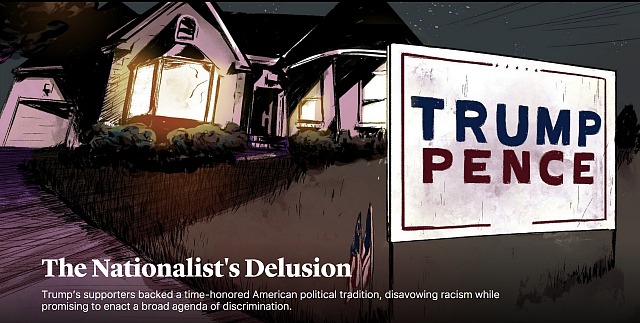Four days ago The Atlantic‘s Adam Serwer posted “The Nationalist’s Delusion,” a seminal portrait of the racist mindset of Trump Nation — a constituency of white, mild-mannered yahoos who don’t see themselves as racist at all.
“During the final few weeks of the [2016] campaign, I asked dozens of Trump supporters about their candidate’s remarks regarding Muslims and people of color. I wanted to understand how these average Republicans — those who would never read the neo-Nazi website The Daily Stormer or go to a Klan rally at a Confederate statue — had nevertheless embraced someone who demonized religious and ethnic minorities.
“What I found was that Trump embodied his supporters’ most profound beliefs, combining an insistence that (a) discriminatory policies were necessary with (b) vehement denials that his policies would discriminate and (c) absolute outrage that the question would even be asked.
“It was not just Trump’s supporters who were in denial about what they were voting for, but Americans across the political spectrum, who searched desperately for any alternative explanation — outsourcing, anti-Washington anger, economic anxiety — to the one staring them in the face. The frequent post-election media expeditions to Trump country to see whether the fever has broken, or whether Trump’s most ardent supporters have changed their minds, are a direct outgrowth of this mistake.

Key sentence: “These supporters will not change their minds because this is what they always wanted: a president who embodies the rage they feel toward those they hate and fear, while reassuring them that that rage is nothing to be ashamed of.
“Most Trump supporters I spoke with were not people who thought of themselves as racist. Rather, they saw themselves as antiracist, as people who held no hostility toward religious and ethnic minorities whatsoever — a sentiment they projected onto their candidate.
“’I don’t feel like he’s racist. I don’t personally feel like anybody would have been able to do what he’s been able to do with his personal business if he were a horrible person,’ Michelle, a stay-at-home mom in Virginia, told me.
“Far more numerous and powerful than the extremists in Berkeley and Charlottesville who have drawn headlines since Trump’s election, these Americans, who would never think of themselves as possessing racial animus, voted for a candidate whose ideal vision of America excludes millions of fellow citizens because of their race or religion.
“The specific dissonance of Trumpism — advocacy for discriminatory, even cruel, policies combined with vehement denials that such policies are racially motivated — provides the emotional core of its appeal. It is the most recent manifestation of a contradiction as old as the United States, a society founded by slaveholders on the principle that all men are created equal.” “While other factors also led to Trump’s victory — the last-minute letter from former FBI Director James Comey, the sexism that rationalized supporting Trump despite his confession of sexual assault, Hillary Clinton’s neglect of the Midwest — had racism been toxic to the American electorate, Trump’s candidacy would not have been viable.”
